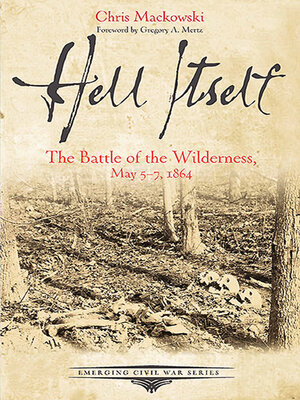Hell Itself
ebook ∣ The Battle of the Wilderness, May 5-7, 1864 · Emerging Civil War
By Chris Mackowski

Sign up to save your library
With an OverDrive account, you can save your favorite libraries for at-a-glance information about availability. Find out more about OverDrive accounts.
Find this title in Libby, the library reading app by OverDrive.



Search for a digital library with this title
Title found at these libraries:
| Library Name | Distance |
|---|---|
| Loading... |
A Civil War historian recounts the first battle between Ulysses S. Grant and Robert E. Lee—a bloody and horrifying conflict in the Wilderness of Virginia.
Known simply as the Wilderness, soldiers called the seventy square miles of dense Virginian forest one of the "waste places of nature" and "a region of gloom." Yet here, in the spring of 1864, the Civil War escalated to a new level of horror.
Ulysses S. Grant, commanding all Federal armies, opened the Overland Campaign with a vow to never turn back. Robert E. Lee, commanding the Confederate Army of Northern Virginia, moved into the Wilderness to block Grant's advance. Thick underbrush made for difficult movement and low visibility. And these challenges were terrifyingly compounded by the outbreak of fires that burned casualties and left both sided blinded in a sea of smoke.
Driven by desperation, duty, confusion, and fire, soldiers on both sides marveled that anyone might make it out alive. "This, viewed as a battleground, was simply infernal," a Union soldier later said. Another called it "Hell itself."
Known simply as the Wilderness, soldiers called the seventy square miles of dense Virginian forest one of the "waste places of nature" and "a region of gloom." Yet here, in the spring of 1864, the Civil War escalated to a new level of horror.
Ulysses S. Grant, commanding all Federal armies, opened the Overland Campaign with a vow to never turn back. Robert E. Lee, commanding the Confederate Army of Northern Virginia, moved into the Wilderness to block Grant's advance. Thick underbrush made for difficult movement and low visibility. And these challenges were terrifyingly compounded by the outbreak of fires that burned casualties and left both sided blinded in a sea of smoke.
Driven by desperation, duty, confusion, and fire, soldiers on both sides marveled that anyone might make it out alive. "This, viewed as a battleground, was simply infernal," a Union soldier later said. Another called it "Hell itself."







